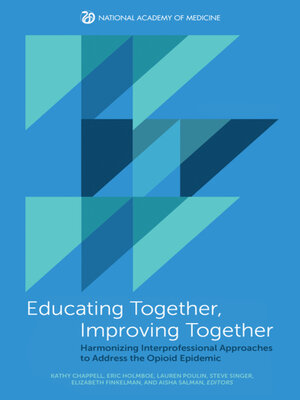Educating Together, Improving Together
ebook ∣ Harmonizing Interprofessional Approaches to Address the Opioid Epidemic
By National Academy of Medicine

Sign up to save your library
With an OverDrive account, you can save your favorite libraries for at-a-glance information about availability. Find out more about OverDrive accounts.
Find this title in Libby, the library reading app by OverDrive.



Search for a digital library with this title
Title found at these libraries:
| Loading... |
<p>The United States is in the midst of an urgent and complex opioid crisis. To address how education and training can more effectively respond to this crisis, we must have a better understanding of problems in practice?or professional practice gaps?for health professionals and teams in practice. A coordinated response requires identifying and addressing professional practice gaps (PPGs) related to pain management, opioid use disorder, and other substance use disorder (SUD) care, as well as integrating evidence-based best practices into health professional education and training curricula across the continuum from undergraduate training into post-graduate continuing education This Special Publication presents two information-gathering efforts to assess persisting PPGs pertaining to pain management and SUD care and to better understand the current health professional education environment: the first is a comprehensive literature review, and the second is a survey of the regulatory landscape.</p>
<p>The results underscore the need to collaboratively develop a harmonized interprofessional, person- and family-centered approach for the continuum of health professions education to more effectively address the opioid crisis.</p>
<p>In this Special Publication, the Health Professional Education and Training Workgroup of the National Academy of Medicine?s Action Collaborative on Countering the U.S. Opioid Epidemic identified five action-oriented priorities to support this goal:</p>
<ol>
<li>Establish minimum core competencies in pain management and substance use disorders for all health care professionals, and support tracking of health care professionals? competence</li>
<li>Align accreditors' expectations for interprofessional collaboration in education for pain management and substance use disorders</li>
<li>Foster interprofessional collaboration among licensing and certifying bodies to optimize regulatory approaches and outcomes</li>
<li>Unleash the capacity for continuing education to meet health professions learners where they are through investment and leadership, and</li>
<li>Collaborate to harmonize practice improvement initiatives</li>
</ol>
<p>With due effort and support, these approaches will amplify effective practices while harmonizing and improving the environment for health care professionals to best serve the needs of their patients and communities.</p>






